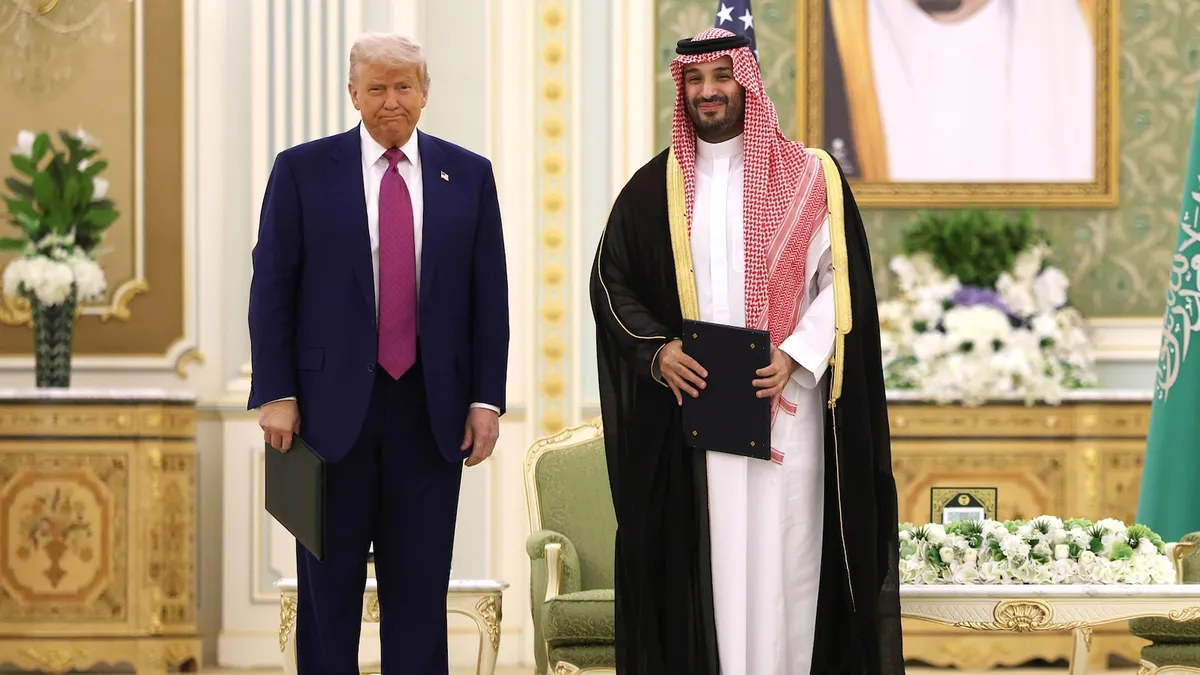
On Tuesday, His Royal Highness Prince Mohammed bin Salman, the crown prince and prime minister of Saudi Arabia, will make his first official visit to the United States since 2018. This visit comes in the wake of the global outrage following the murder of Jamal Khashoggi, a Saudi critic, by agents in Istanbul. Although Prince Mohammed denied ordering the operation, he ultimately accepted responsibility as the kingdom's de facto ruler. Now, over seven years later, the Saudi leader aims to focus on strengthening ties with the U.S. through cooperation on oil and security, while also expanding Saudi Arabia's global influence in finance, artificial intelligence, and technology.
Saudi Arabia stands as the world's largest economy and remains the top oil producer globally. During his visit, the crown prince is expected to meet with President Donald Trump at the White House, where he will be received with great ceremony. In preparation for his arrival, Saudi flags were displayed alongside American flags outside the White House. Additionally, President Trump is set to host a dinner for the Saudi leader on Tuesday evening.
This visit is not merely ceremonial; it is billed as an official working visit aimed at following up on Trump's earlier appearance in Riyadh. Elizabeth Dent, a senior fellow at the Washington Institute for Near East Policy and former director for the Gulf and Arabian Peninsula at the Pentagon, emphasized that this meeting could provide clarity on previously announced financial, economic, and artificial intelligence deals that remained vague six months ago.
During Trump's visit to Saudi Arabia in May, he announced a landmark $142 billion arms package, the largest defense cooperation agreement in U.S. history. This agreement covers a range of deals with over a dozen U.S. defense companies, focusing on various sectors such as air and missile defense, air force advancements, maritime security, and communications. In response, Saudi Arabia pledged a substantial $600 billion investment in the U.S., which encompasses multiple sectors, including energy security, defense, technology, global infrastructure, and critical minerals.
Among the notable investments included in this $600 billion pledge are initiatives in U.S.-based artificial intelligence data centers, energy infrastructure, and advanced technologies. Furthermore, Trump confirmed plans to sell F-35 fighter jets to Saudi Arabia, marking a significant development as it would be the first sale of these advanced jets to an Arab military. However, this raises concerns about maintaining Israel's qualitative military edge in the region.
As regional tensions escalate, the Saudi crown prince is also seeking security guarantees from the U.S. The security agreement is currently in the development stage and has not been formalized, but it aims to enhance military and security ties between the two nations. Some analysts believe these guarantees are part of a broader regional initiative involving normalization with Israel, an agenda that Trump is likely to advocate, despite Saudi Arabia's refusal to engage with the current Israeli leadership.
Trump mentioned that he hopes Saudi Arabia will soon join the Abraham Accords, which would signify a major diplomatic shift in the Middle East. Earlier this year, Trump signed a significant defense pact with Qatar that recognizes the enduring alliance between the U.S. and Qatar, providing explicit security guarantees. Many believe that Saudi Arabia is looking for a similar form of defense agreement with the U.S., which would declare any attack on Saudi Arabia an attack on the United States, allowing for a range of responses from political to military action.
Additionally, the Saudi leadership is invested in implementing the president's 20-point Gaza peace plan. They have expressed a desire for a credible pathway toward an independent Palestinian state as a condition for supporting the demilitarization of Hamas and the reconstruction of Gaza. However, Israeli Prime Minister Benjamin Netanyahu has firmly opposed a Palestinian state, insisting that Gaza will be demilitarized and Hamas disarmed, regardless of the circumstances.
Netanyahu's stance presents a significant obstacle to achieving peace in the region and may exacerbate tensions among Arab nations advocating for a resolution in Gaza. As conversations continue, the outcomes of Prince Mohammed bin Salman’s visit remain pivotal in shaping the future of Saudi-U.S. relations and the broader Middle Eastern geopolitical landscape.